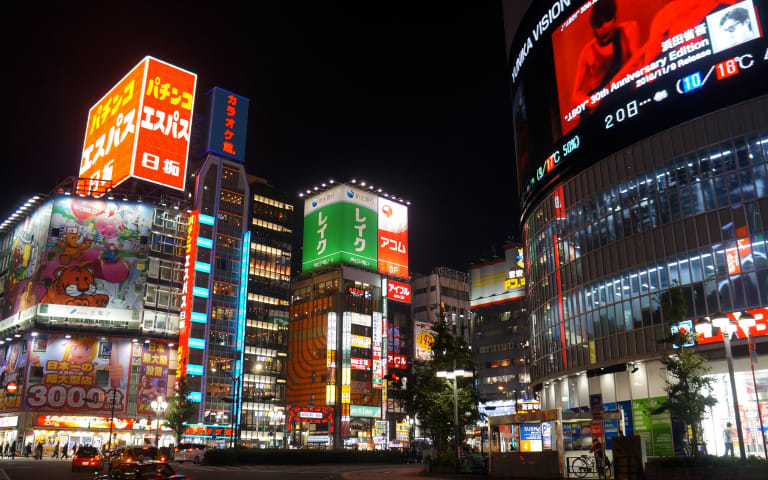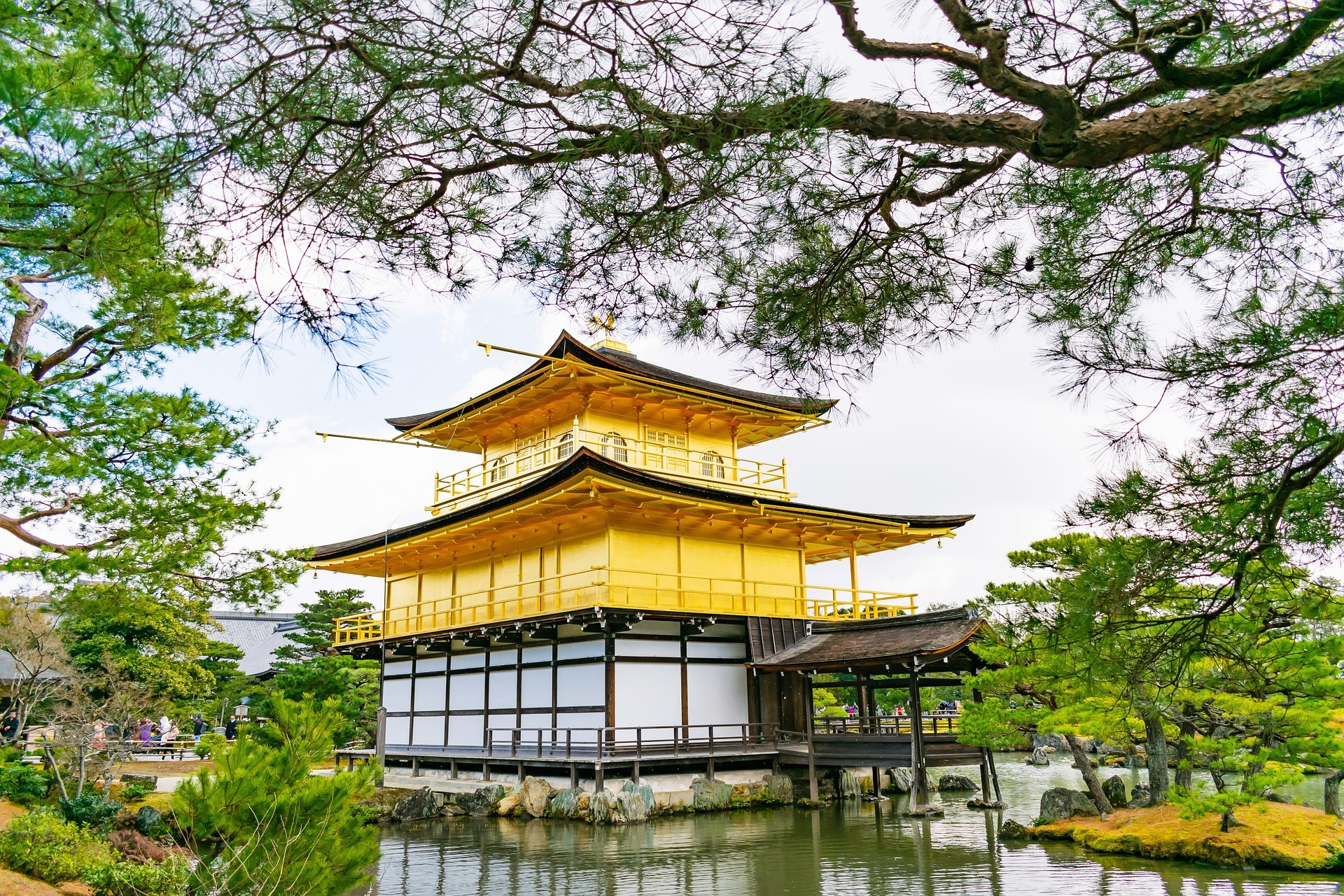More about: 6 Best Day Trips from Kyoto
If you want to get a taste of life around the city, I suggest opting for a guided tour from Kyoto. This tour will take you to magical places such as Kibune, Higashiyama and Kurama - you don't have to worry about a thing! You will have a guided tour, an organised itinerary and visits to off-the-beaten-path places.
If you want to get out of the city, you can visit nearby cities such as Osaka, Nara, Hiroshima, Tokyo and its surroundings. You can travel by bullet train and take advantage of the transport facilities offered by the JR Pass.
1. Take a private tour to Kibune and Kurama from Kyoto

On this tour to Kibune and Kurama villages from Kyoto, you can see some of the city's best temples hidden in the mountains. The advantage of this experience is that it is done on foot, so before leaving the city you will pass through local districts.
Kibune is a village in the forested valley of the Kyoto mountains. Here you can visit Japanese souvenir shops, eat at riverside restaurants, or enter a traditional ryokan. Ryokan are Japanese inns, distinguished by their tatami rooms with futon mattresses flush with the floor.
Kurama is a paradise destination near Kyoto. It is a mountain known as the home of reiki, a healing discipline that attracts thousands of people a year. Locals say it is a protected space for Japan's mystical creatures, better known as tengus.
If you're looking for activities to do with children in Kyoto, you can take advantage of the easy hiking route with rest areas. During this tour you will be able to visit:
- Fushimi Inari Shrine: it is a place to venerate the spirit of the god Inari and learn about his traditions.
- Nijo-jo Castle: it is linked to the traditions of ancient Japan, it is ideal to escape from the tourist crowds.
- Kyoto Imperial Palace: it was the home of Japanese royalty for centuries. Nowadays, visitors are not allowed inside, but you can walk around the structure. You are also allowed to walk around the gardens and get a close look at its shrines, ponds, teahouses, among others.
- Higashiyama District: it is a traditional area where souvenir shops and Japanese objects abound. It is located at the foot of the mountains and is a photographic environment.
- Arashiyama district: located on the outskirts of the city, it is an ideal place for activities in Kyoto during autumn.
Details of interest
- Price: from €100.
- Duration: approximately four hours.
- Means of transport: this is a daytime walking tour, which only includes pick-up at the meeting point, but you must organise other transfers. The fastest way to get there is by car, while the cheapest options are by train or bus. There is no obligation to return to Kyoto with the rest of the group, so you can spend the night in a ryokan.
2. Enjoy a trip to the Higashiyama mountain range from Kyoto

Kyoto has around eleven districts, the private tour of Fushimi Inari, Gion and Kiyomizudera will take you to see the historic areas. It is among the best things to do in the city, due to its varied itinerary.
You can see the Higashiyama Mountain Range, a mountain on the outskirts of the city that beautifies Kyoto's spaces. The Fushimi Inari Shrine, founded in 711 AD, is located in this area. There are also a variety of mystical and vermilion torii gates, which are rare and can only be found in Japan.
Additionally, I recommend you take advantage of the activities in Kyoto during autumn, as the blooming of flowers beautifies the streets.
Interesting details
- Price: from 100 €.
- Duration: approximately four hours.
- Means of transport: it is a walking tour that includes some transfers, such as the train to the Gion Mountains.
3. Visit the city of Nara from Kyoto

The city of Nara is the perfect getaway if you want to see other parts of the country. It is known for its large number of deer, which often roam freely in the streets. It was also the capital of Japan during medieval times, so you can take advantage of this tour to see its relics.
I recommend leaving early in the morning to make the most of your time. During the tour you will be able to visit:
- Tōdai-ji Temple: a wooden Buddhist temple, known for housing the largest seated Buddha in Japan.
- Kofukuji Temple: it was built in the year 669 by a very powerful family, known as the Fujiwara clan. It houses objects from this period, as well as a collection of statues. Admission is free, but to enter some rooms, such as the National Treasure Museum, you have to pay around €5.
- Isuien Garden: created in the Edo period, it was a space reserved for the upper class, but nowadays it is free of charge. It was built using the Japanese Shakkei technique, which respects the nature surrounding a building.
Interesting details
- Price: from €60.
- Duration: about six hours.
- Means of transport: some tours include transport, but you can get there on your own in about forty minutes by taking a train from Miyakoji Station.
4. Make the most of a trip to Hiroshima and Miyajima from Kyoto

You've probably heard of Hiroshima, a city famous for its tragic history. During World War II, an atomic bomb exploded, destroying much of the city.
In fact, on Naka-ku Street, you can see the point of the explosion. The city has many places where you can learn more about the event, for example:
- Hiroshima Peace Museum: there is more information about the explosion, both in Japanese and English. I don't recommend visiting with children, as some exhibits include sensitive content. It costs about €2.
- Cenotaph: is a centrally located memorial dedicated to the victims. Flowers and memorials are laid every day. In addition, there is an inscription on the stones in Japanese which translates as rest in peace, the mistake will not be repeated.
- Peace Park: Here you can ring the Peace Bell and walk through the Gates of Peace.
Sail to Miyajima Island from Hiroshima
Miyajima is a sacred island with a giant torii in the middle of the sea. The torii gates are sacred arches that protect the country's promised land. In addition, the archipelago abounds with deer and is a great place to take photographs.
It is a popular destination for couples, who book romantic evenings at ryokan in the area. You can take advantage of your trip to Hiroshima to take a 30-minute boat ride to the island.
However, if you are travelling from Kyoto and do not want to enter Hiroshima, you can choose the following transport options for your excursion:
- The fastest option: travelling by train to Hiroshima Central Station takes about two hours. You will then transfer to Miyajimaguchi, from where boats depart for the island.
- The most customisable option: travel by car directly to Miyajimaguchi and use a car ferry to the island.
- The cheapest but slowest option: travel by bus to Hiroshima, which runs three times a day. Then take a ferry at Motoyasu Pier Hiroshima which departs every hour, for around €16.
Details of interest
- Price: from €50.
- Duration: about eight hours.
- Means of transport: some tours do not include transport, so you can take a train from Kyoto Central Station to Hiroshima, which takes about an hour and a half to reach the city.
5. Venture to Osaka from Kyoto

Osaka is a port city that attracts tourists, thanks to its nightlife and quirky street food offerings. The best way to get there from Kyoto is to take a Shinkansen, also known as a bullet train. Here you can visit:
- Dontobori district: it is an area full of neon screens and decorations, it will probably remind you of Time Square in New York.
- Osaka Castle: it has a charming architecture and eight floors full of history. There is also a museum here where you can learn more about the city, as well as the Nishinomaru Gardens. Admission is around €4.
- Shinsekai Quarter: with over 100 years of history, its architecture was inspired by the façades of Paris and Coney Island in New York. It is ideal if you want to take pictures, or just walk through its alleys.
Interesting details
- Price: from 65 €.
- Duration: about eight hours.
- Means of transport: there are several tours that include transport within Osaka. However, you may need to travel on your own from Kyoto, the best way is to take a bullet train from €5.
6. Travelling to Tokyo by bullet train from Kyoto

While Kyoto was the capital of Japan in about 794, today that position is held by Tokyo. The contrast between the two cities is striking, with the former being ancient and welcoming, while the Japanese capital is bustling and modern.
What they have in common is that they both have traditional spaces and a fun nightlife. Take advantage of this trip to Tokyo to visit:
- Shinjuku: it is a shopping street where skyscrapers abound, there are many free viewpoints that will give you the best views of the city.
- Tokyo Tower: an icon of the city, it is a replica of the Eiffel Tower, but with some modifications. You can walk on transparent glass 150 metres above the city.
Details of interest
- Price: from 80 €.
- Duration: approximately ten hours.
- Means of transport: I suggest taking a bullet train, which shortens the journey from five to two hours. Trains leave every hour, so it is important to arrive early.
Is it worth taking a guided tour?

While you can visit cities around Kyoto on your own by bus, car or train, I suggest opting for a guided tour. This is a private and safe option, where a professional guide will guide you and help you make the most of your time. It is ideal if you plan to visit Kyoto in two days, as it will allow you to make the most of your time. It is also a great option if it is your first time in Japan and you don't know how to organise your itinerary.
For example, when visiting Fushimi Inari Shrine independently, many people tend to go around the shrine and walk through its tunnels. This way, they miss the most important thing: this monument holds local stories that your guide will reveal to you. You can learn more about the origin of the shrine, the god Inari, the importance of the fox in Japanese culture and more.
Additionally, a hike is a great option if you want to see the surroundings without any worries. You can enjoy a stress-free trip, leaving the organisation to the professionals.
JR Pass for sightseeing tours from Kyoto

To save a few euros you can buy the JR Pass or Japan Rail Pass, a transport card for foreigners. It has many benefits, for example you can use it for:
- The bullet train, except for the fastest trains in Japan, known as Nozomi and Mizuho.
- The ferry to Miyajima Island.
- The train from Tokyo and Osaka airport.
- Some underground lines, such as Jr of Tokaido Line in Kyoto, Osaka Loop Line and Yamanote Line in Tokyo.
- The Hiroshima sightseeing bus.
The card costs around €235 for 7 days, but you can save more money if you order online. Please note that to use your pass without any problems, you must carry your passport.











